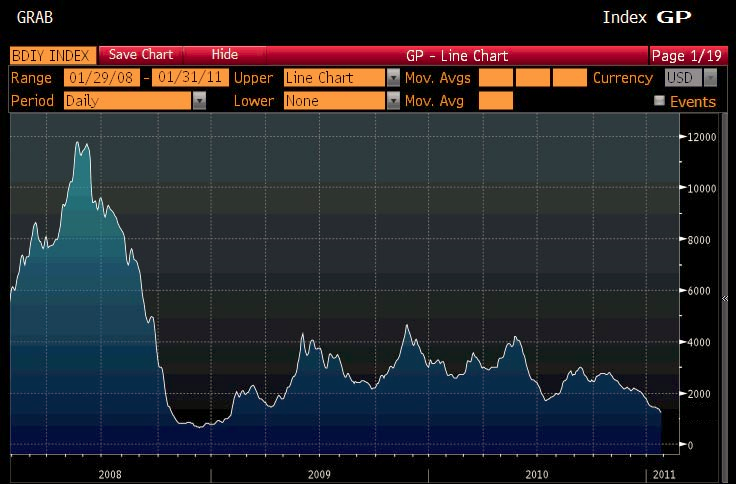Anyone following the Baltic Dry Index over the last few years has likely been frustrated by its utter lack of usefulness. The index has remained fairly weak throughout the economic recovery despite significant recoveries in similar indices such as rail traffic and trucking traffic.
In the last few months, however, the index has tanked over 60% as commodities have surged and investors are once again starting to pay attention to the index that dropped like a rock in water during the financial crisis. The only index that has a relatively high correlation with the Baltic Dry is the Shanghai equity composite. This makes sense as exports still represent a substantial portion of the Chinese economy. There are signs that higher inflation is causing a slow-down in China’s exports (via CNBC):
“Inflation is starting to slow China’s mighty export machine, as buyers from Western multinational companies balk at higher prices and have cut back their planned spring shipments across the Pacific.
Markups of 20 to 50 percent on products like leather shoes and polo shirts have sent Western buyers scrambling for alternate suppliers. But from Vietnam to India, few low-wage developing countries can match China’s manufacturing might — and no country offers refuge from high global commodity prices.Already, the slowdown in American orders has forced some container shipping lines to cancel up to a quarter of their trips to the United States this spring from Hong Kong and other Chinese ports.”
Is the Baltic Dry Index a sign that China’s real economy is weaker than some think? It’s impossible to tell as government fueled growth in China continues to mask any real economic activity. The one thing we do know is that the Shanghai Composite continues to exhibit very poor performance and the BDI is now just points shy of its all-time lows. If these indices are pointing to slower growth in China then it would certainly be safe to say that analysts are overly optimistic about the global recovery.

Baltic Dry Freight Index
Mr. Roche is the Founder and Chief Investment Officer of Discipline Funds.Discipline Funds is a low fee financial advisory firm with a focus on helping people be more disciplined with their finances.
He is also the author of Pragmatic Capitalism: What Every Investor Needs to Understand About Money and Finance, Understanding the Modern Monetary System and Understanding Modern Portfolio Construction.

Comments are closed.